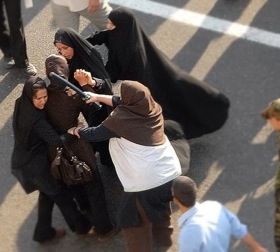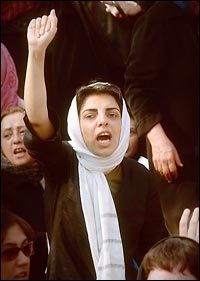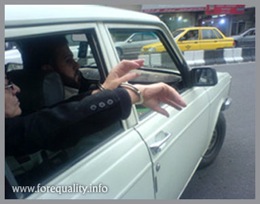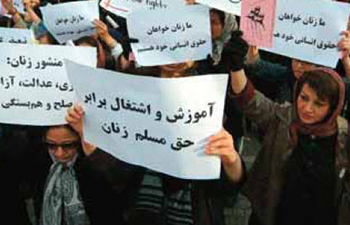
Women in Iran have learned to unleash the Internet’s potential to promote freedom. In the country that has, according to the OpenNet Initiative, experienced the most explosive online growth in the Middle East, the Internet has become a battleground between a repressive regime and the increasingly active feminists demanding the end of legal discrimination against women.
Women activists, who in the 1990s relied on public demonstrations, in-person contacts and door-to-door advocacy, have now taken their initiatives to cyberspace. The feminist Campaign for Equality launched an online petition called One Million Signatures Demanding Changes to Discriminatory Laws in August 2006; it has already garnered more than 10,000 signatures. Radio podcasts dealing with women’s issues are accessible on the activists’ websites, and women also circulate information through expanding email lists.
For the first time, the women’s movement is not restricted to a certain elite, but includes women of all ages and backgrounds, from big cities to small villages. All these women are united in support of this cause — women who now share the same dream of no longer being second-class citizens.
After a wave of repression in the ’80s, Iranian mothers were reticent to let their daughters contest the new order. In contrast, today many support their daughters fighting for equal rights and some older women even get involved themselves. The power of the Internet, accessible to everyone, has removed the class barrier, allowing all woman to receive and exchange information. The movement has no centralized leadership: The Campaign for Equality is spearheaded by acting or former journalists or novelists barred from writing about their aspirations in the government-monitored mainstream media.
Background on Women’s Rights in Iran
The Iranian legal system is based on the Sharia, the Islamic law, and denies women many rights, including the rights to file for divorce or to claim custody of their children. Women are treated as second-class citizens in other ways, too:
> A woman’s court testimony is afforded less value than that of a man.
> In cases of wrongful injury or death, a woman’s punitive damages are limited to half those of a man.
> In cases of adultery, both partners can be sentenced to stoning, but a woman is stoned while buried up to her neck while a man’s arms are left free.
> The legal age of judicial responsibility is 15 for boys, but only 9 for girls — meaning that girls as young as 9 can be executed as adults.
The repressive Iranian regime does not tolerate criticism. It fears the women’s movement not only because it could elevate the status of women but also for its potential to fuel a broader trend demanding democratic reform in the country.
The government dismisses any accusations that it discriminates against women, but, according to Amnesty International, “women in Iran face far-reaching discrimination under the law.” Even so, Amnesty found that “with the increase of women’s literacy in the last 30 years, women are increasingly empowered to challenge discrimination.”
Activists Are Jailed
Several activists have been imprisoned for speaking out. Two “cyber-feminists” were held for more than a month at the infamous Evin prison in December after writing articles calling for equal rights with men. Jail was the one place they reported receiving equal treatment with men: Both men and women are made to endure very bad prison conditions and multiple interrogation sessions. When journalist Jila Baniyaghoob was released, she spoke of being locked away in a filthy cell, awakened several times each night and led, blindfolded, to yet another interrogation. She spent over a week in the notorious section 209, a detention center where Iranian secret services can hold political prisoners in solitary confinement and conduct torture with complete impunity.

Jila runs an association of Iranian women who have been active in spreading the word about women’s untold ordeals. She has published on her website stories ignored by the mainstream media for lack of interest or fear of official retribution. One such story was that of medical student Dr. Zahra Bani Yaghoob, who was arrested while walking with her fiance in a park in Hamedan province. The two were unable to show a legal marriage certificate when confronted by the local militia. Later that day, the police called her family to pick her up.
But when relatives arrived, they were told Yaghoob had committed suicide, a story disputed by her family and friends. Jila and others helped publicize the case, especially after a local judge acquitted the men suspected of killing Yaghoob. Thanks to pressure brought by these feminists, the case has now been moved to Tehran.
Speaking out is still dangerous for women in Iran. Jila has received many death threats because of her involvement in the Yaghoob case. In March 2007, 33 female journalists and activists were arrested while demonstrating for their rights. Four received prison sentences ranging from six months to a year.
Several days ago, cyber-feminists Parvin Ardalan, Jelveh Javaheri, Maryam Hosseinkhah, and Nahid Keshavarz, were sentenced to six months in prison after writing about women’s rights for online newspapers like Zanestan. They are still free pending the outcome of their appeals, but a sword of Damocles clearly hangs over their heads. Their sentences were intended to send a strong warning to force other female activists into self-censorship.

These four cyber-feminists, however, can count on domestic and international support: Ardalan was awarded Sweden’s Olof Palme Prize this year. Famous Nobel Prize recipient, women’s rights activist and lawyer Shirin Ebadi has agreed to represent all four. She told Reporters Without Borders earlier this month: “These four journalists have been convicted just for writing articles and criticizing laws that are unfair to Iranian women.”
Internet No Longer a Safe Haven
The Internet is no longer a safe heaven for free expression in Iran. A draft law passed by Parliament on first reading last July would extend the death penalty to crimes committed online, including bloggers and website editors who “promote corruption, prostitution or apostasy.” Shirin Ebadi told Reporters Without Borders that she was “worried because I see the situation getting worse. If Parliament ratifies the new law increasing sentences for crimes against society’s moral security, bloggers could get prison sentences.”
The backlash is not limited to judicial persecution. Authorities have also used technology to stop the activists. Iran is on Reporters Without Borders’ list of Internet enemies and has one of the world’s most extensive and sophisticated systems for censoring and filtering Internet content.

In recent years. women’s rights have become one of the top subjects targeted by government web censors, along with sites advocating political reform or hosting pornography. The online newspaper Tagir Bary Barbary (“Change for Equality”) was forced to change its URL after it was blocked several times. To get around official censorship, several “One Million Signatures” campaign websites are now hosted in various Iranian cities as well as in other countries, including the United States, Germany and Kuwait.
With the “One Million Signatures” campaign, the women’s movement in Iran has reached a new dimension beyond gender-only issues. The Men’s Committee of the One Million Signatures Campaign has also been collecting signatures. One of it members, Amir Yaghoub Ali, was arrested in July 2007 and spent 29 days in the Evin Prison. In an interview, he told Mahboubeh Hosseinzadeh that men’s involvement proves that “unequal laws do not only affect women, but harm all of society —- as they affect family and human relations more broadly.” But there are still many conservative forces within the Islamic republic who disapprove of the campaign.
Now the question is: What will happen once the one million signatures have been collected?
Activists believe the government will not be able to ignore them once they have collected such a huge number of signatures. The movement has become stronger than ever. Earlier this month, it scored a real success. The Parliament was debating a government-sponsored “protection of the family” bill that included two articles that would have allowed a man to take a second wife without his first wife’s permission and submitted the women’s dowry to taxes respectively. Lawmakers removed the articles after women activists threatened to hold peaceful demonstrations in front of the Parliament.
The authorities should think twice before rejecting the women’s demands or the One Million Signatures campaign could very well become a “One Million Person Demonstration.”
Lucie Morillon is the Washington, DC, director of Reporters Without Borders, an international press freedom organization. She covers press freedom issues in the U.S. and abroad and is a spokesperson for the group. She also handles advocacy work with Congress and has appeared on CNN, ABC and has been quoted in the New York Times, Washington Post, and other publications. Reporters Without Borders strives to obtain the release of jailed journalists and cyber-dissidents and supports an independent media and the free flow of information online. Morillon is the free-speech correspondent for MediaShift.


VERY NICE
I AM IRANIAM
I LOVE U
La Malbaie. Bon, cest connu, vous aurez dans votre camera le Manoir Richelieu.
Mais laissez-vous tentez par une ballade sur le chemin des Falaises et votre oeil saura
reconnaître les attraits de notre riche patrimoine bati.
Toute lhistoire de la villegiature des riches estivants venus a bord des bateaux blancs
se retrouvera alors dans votre oeilleton.
Gastronomie à Québec Art et Vacances à Charlevoix Magazine Découvertes
I had a dream to start my own company, but I didn’t earn enough of money to do it. Thank God my close mate advised to use the loan. Thence I took the financial loan and made real my desire.